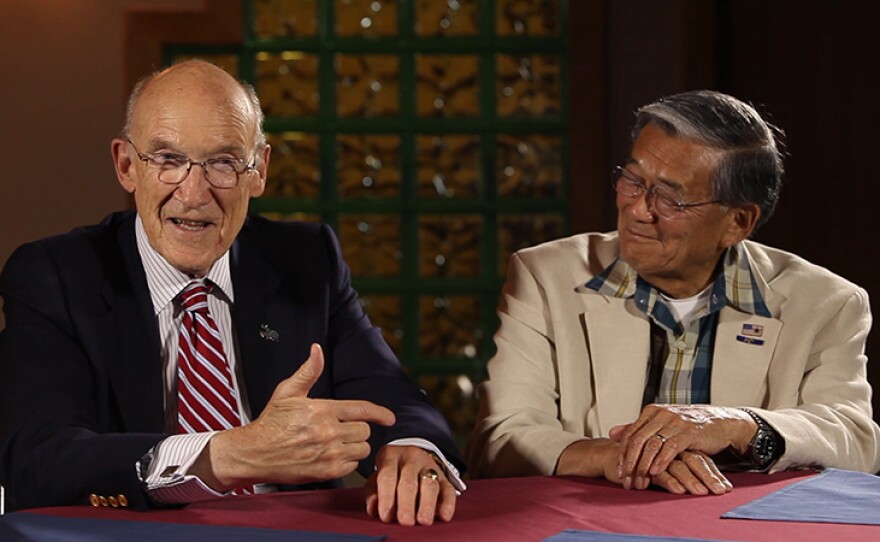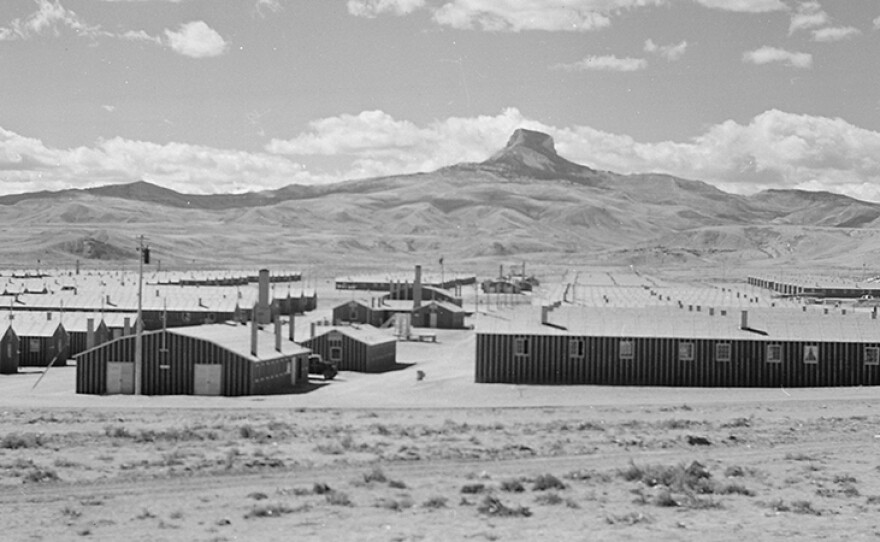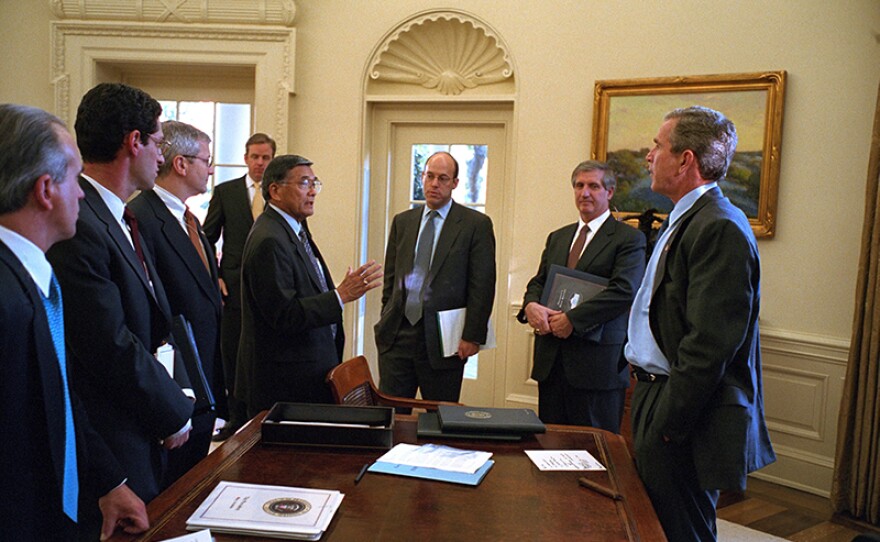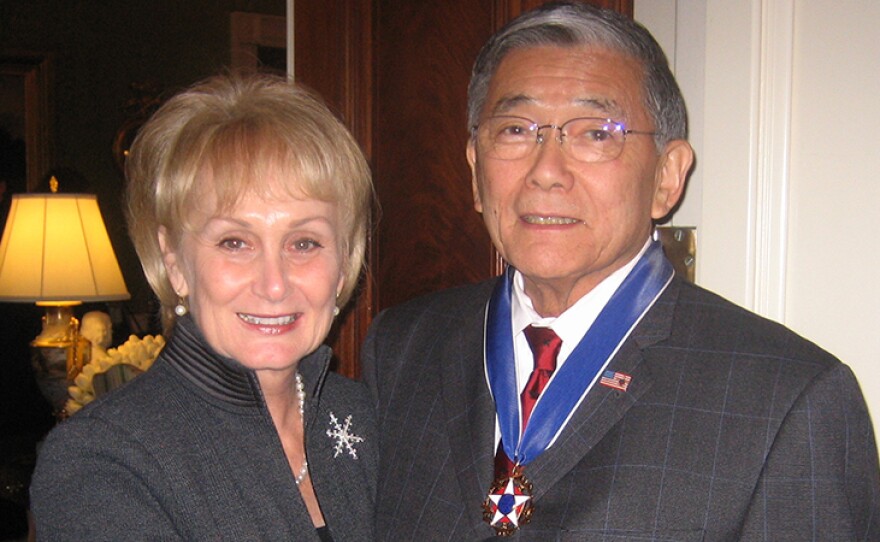Wednesday, Aug. 10, 2022 at 10 p.m. on KPBS 2 / On demand now with KPBS Passport!
“Norman Mineta And His Legacy: An American Story,” a documentary portrait of the American statesman and trailblazer, includes interviews with the two presidents under whom he served as a cabinet secretary: Democrat Bill Clinton and Republican George W. Bush.
Also interviewed is retired Republican Senator Alan Simpson, who formed a lifelong friendship with Mineta when they met as 11-year-olds at Heart Mountain, Wyoming, the U.S. concentration camp where Mineta and his family were incarcerated during World War II.

Norman Mineta is a man of many firsts:
- The first Asian American mayor of a major city (San Jose, California)
- The first Japanese American from the mainland to be elected to Congress
- The first Asian American to serve in a presidential cabinet
But beyond these groundbreaking achievements, Mineta personifies the dreams and aspirations of many Americans.
A U.S. citizen by birth, he was imprisoned by his own country for his Japanese ancestry, yet he steadfastly remained a patriot, leading a Congressional effort for an apology from the U.S. government and redress for Japanese Americans, 120,000 of whom were imprisoned during the war.

That effort finally came to fruition when the Civil Liberties Act of 1988 was signed into law by President Ronald Reagan. During his 21 years in Congress, Mineta worked to right other wrongs.
Retired Representative Barney Frank of Massachusetts speaks in the film of the role Mineta played in endorsing same-sex marriage.
A co-author of the 1991 Americans with Disabilities Act, Mineta pushed to make public facilities accessible after navigating San Jose in a wheelchair and realizing it was impossible to cross the street. Because of the ADA, streets around the country now have cutouts for wheelchair access.
When Mineta was serving as Secretary of Transportation under George W. Bush, the president learned firsthand of Mineta’s time in a concentration camp.
A few months later, in the aftermath of Sept. 11, 2001, the knowledge of what his cabinet secretary went through had an impact.
“One of the important things about Norm’s experience is that sometimes we lose our soul as a nation,” said Bush. “The notion of ‘all equal under God’ sometimes disappears. And 9-11 certainly challenged that premise. So right after 9-11, I was deeply concerned that our country would lose its way and treat people who may not worship like their neighbor as non-citizens. So, I went to a mosque. And in some ways, Norm’s example inspired me. In other words, I didn’t want our country to do to others what had happened to Norm.”

In 2006, Secretary Mineta resigned from the Bush administration. He had served more than five years, longer than any Secretary of Transportation in American history.
In his three decades as a public servant, he had served as a city councilman, a mayor, an eleven-term congressman, and a cabinet member for both a Democratic and a Republican president.
“Norm Mineta spent his life both proving by his own achievements that America was working for more and more people but also trying to give that chance to everybody else,” said President Clinton. “And that’s a worthy life. It should be honored, but more importantly, it should be emulated.”

What Does It Mean to Be an American? – The Mineta Legacy
The broadcast will be accompanied by free online educational curriculum being developed by the Stanford Program for International Cross-Cultural Education (SPICE) at Stanford University.
Featuring original content separate from the film, the curriculum includes a roundtable discussion with high school students discussing their own present-day experiences with discrimination, social activism and leadership.
The modular-based curriculum designed for high school and university educators uses Mineta’s life and experiences as touchpoints to educate students about immigration, civic engagement, leadership, U.S.-Japan relations, and justice and reconciliation.
Join The Conversation:
Mineta Legacy Project is on Facebook and Instagram. #MyMinetaMoment
Credits:
Directed and produced by Dianne Fukami, co-produced by Fukami and Debra Nakatomi, and written by Ken Chowder. The executive producer is Lawrence R. Hott. The film is narrated by Wendy Tokuda and the director of photography is Robin Mortarotti. The editor is Hailey Yang. The associate producer is Amy Watanabe; Marc Smolowitz is consulting producer. Music composed by Derek Nakamoto.





